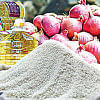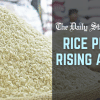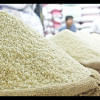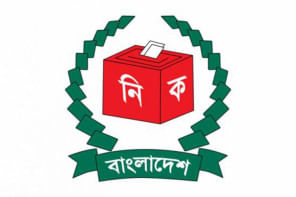How much do the poor pay for rice? At least Tk 50 a kg

Rice price in Bangladesh is rising and the rate of coarse grain has crossed Tk 50 a kilogramme nearly after a year, straining further the buying capacity of low-income people, who are already struggling to make ends meet amid higher inflation.
Retailers blame the increase for the spike at the wholesale level while wholesalers say it has gone up at the mill level. Millers put the blame on costlier paddy stemming from the delay in planting and harvesting of Aman.
At the retail level in Dhaka yesterday, coarse rice, mostly consumed by the poor and lower-income groups, was sold for Tk 51 per kg, which was Tk 50 in November and Tk 49 in October, according to state-run Trading Corporation of Bangladesh (TCB). This means the price has increased by an average 3 percent in the last one month.
The finer variety is being sold at Tk 68.5 per kg and the medium grain at Tk 56.5.
Dhiren Babu, a retailer at the Town Hall Bazar in the capital's Mohammadpur, said he is selling coarse rice at Tk 51 to Tk 52 a kg depending on varieties.
Farmers say owing to unfavourable weather, there was some delay in both plantation and harvesting of Aman, the second-biggest rice crop in Bangladesh, accounting for more than 38 percent of total rice production.
Mohammad Nazim, a farmer in Chuadanga's Damurhuda upazila, said they usually start the harvesting of Aman in the first week of November and it finishes in the middle of the month.
"This year, harvesting was completed in early December."
Mohammad Rubel, who works in a school and has land where paddies are cultivated in his village home in Jamalpur, says his workers finished harvesting of the paddy on Friday.
"The price of rice will decrease once new rice hits the market," said Dhiren.
Abdur Rab, a floating tea seller in Dhaka's Mirpur, said the prices of every essential have reached an unbearable level. "Last Saturday, I went to markets to buy five kgs rice. After seeing the price increase, I bought four kgs because I had to buy some other essentials."
"The prices of essentials are on the rise but our income does not increase every week."
The 53-year-old says he could not describe how difficult it has become for him to make a living. "Due to the rising cost of living, people don't even consume as much tea and cigarettes as they did in the past. Who will I tell about my suffering?"
According to the Bangladesh Bureau of Statistics, food inflation stood at 12.56 percent in October, the highest in at least a decade. It, however, slipped to 10.76 percent in November.
Ranjan Chakraborty, manager of Majumder Auto Rice Mill in Sherpur upazila of Bogura, said the price of rice has increased due to the higher paddy price.
At present, millers are buying Swarna-5 paddy at Tk 1,090 per maund. If the transport and milling costs is taken into account, the cost of production of coarse rice stands at Tk 48 per kg.
"So, it is not possible to sell the rice at less than Tk 50 per kg," Chakraborty said.
However, the price of all types of rice dropped in Dinajpur, one of the major rice-producing regions in the northern part of the country, by Tk 150-Tk 200 for each 50-kg bag within a span of two weeks.
During a visit to the retail and wholesale markets at Bahadurbazar and Railbazarhat in the district town, it was found that a kg of Guti Swarna (coarse rice) is selling at Tk 43, while it was Tk 48 a fortnight ago.
Firoz Ahmed, a wholesaler in Dinajpur's Bahadurbazar, said they are getting a lower volume of rice at the mill gate since the supply of paddy is lower in the markets.
Nirod Boron Saha, a rice trader in Naogaon, a trading hub, blamed the jump in transport costs in recent weeks for the price hike.
He said before the latest spell of blockades, it would cost Tk 12,000 to Tk 13,000 for them to send a truck full of rice as the number of vehicles available to move goods dropped sharply as owners feared torching.
Owing to the blockades, the fare went up to Tk 23,000-Tk 24,000, he said. "We are actually now seeing the impact of the additional transport cost."
Ghulam Rahman, president of the Consumers Association of Bangladesh, said at a time when inflation is high, the price hike does not always depend on supply and demand.
"Traders want to make more profits because there is inflationary pressure. That's why the price went up."
He thinks if the government does not take measures to control inflation in the right way, this situation will not change.
"The government needs to focus more on this issue."
Amid stubborn inflationary pressure, the government has expanded the schemes that give the poor and the lower-income groups cushion against higher prices.
For example, the government distributed 4.74 lakh tonnes of rice and flour through open market sales between July 1 and November 30 this fiscal year, up nearly 47 percent year-on-year from 3.23 lakh tonnes a year ago, data from the food ministry showed.
The distribution under the food-friendly programme rose 17 percent to 4.39 lakh tonnes from 3.75 lakh tonnes.
Still, the rice price is showing an upward trend.
Anu Muhammad, a professor of economics at Jahangirnagar University, said there is no accountability of the institutions responsible for ensuring discipline in the markets.
He said the spike in the prices of essential goods can't be explained by factors such as demand and supply alone.
"The problem related to the price hike can't be sorted out separately. This is a market failure. If this continues, people's suffering will only intensify."
The noted economist says the vested groups that are closed to the government have become desperate since they are not brought to book.
A senior official of a commodity processor says commodity prices usually remain volatile in the months leading to national elections. "One can't explain it from the economics point of view."


 For all latest news, follow The Daily Star's Google News channel.
For all latest news, follow The Daily Star's Google News channel. 








Comments